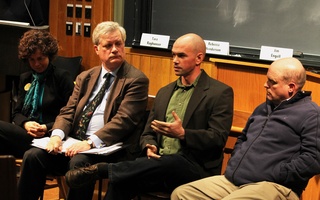Members of Harvard Faculty for Divestment praised the goals of a student sit-in staged last Thursday in Massachusetts Hall, home to the office of University President Drew G. Faust, arguing that the protest returned attention to demands that the University withdraw its investments in fossil fuel companies.
The group—which is comprised of 232 faculty from across Harvard’s schools who have signed an open letter urging the University to divest—issued a statement on their website last week reaffirming their support for the message of Divest Harvard, the activist group behind the protest. The faculty group is affiliated with that organization, which also spearheaded a rally in Harvard Yard on Friday after their 24-hour sit-in.
{shortcode-ad8744cf67677d46cd0cfe8f476322d578a56e49}
“We wanted to make a point of letting people know that we supported the students’ goal,”said Medical School assistant professor James M. Recht, who was one of the four principal authors of the open letter released last April.
Although the group statement did not feature any comment on the students’ choice of protest tactics, some professors who were signatories applauded the tactics as an effective means to raise awareness for the issue.
“It was a peaceful sit-in, got the message across, and got people to talk about divestment again,” said History of Science lecturer Soha Bayoumi.
“I think it was a legitimate use of protest, and I gather it was less disruptive than the last time they blockaded,” Classics professor Richard F. Thomas said. A student was arrested for blocking an entrance to Mass. Hall last May during a previous protest urging the University to divest.
Romance Languages and Literature professor Doris Sommer said that she was “grateful” that the students staged the protest, even if the impacts are not immediate.
“I think that keeping attention to the issue is necessary, and one won't see the effect from one week to the next,” Sommers said.
Recht, for his part, called the method of the sit-in not only necessary but “the right thing to do.”
The faculty group has been quiet since releasing a letter to Faust and Senior Fellow of the Harvard Corporation William F. Lee on Dec. 1 requesting “a well-publicized and well-planned open forum this spring to discuss the University’s role in addressing climate change.” Faust has repeatedly argued that Harvard should not divest from fossil fuels.
But Recht said that this week a national group called Faculty/Staff Divestment network contacted members of Harvard Faculty for Divestment requesting signatures on a petition calling for institutions of higher education to divest from fossil fuel companies. Members comprising a “core group” of about two dozen faculty for divestment have already signed that petition, Recht said, and those core members will begin reaching out to other faculty this week for more signatures.
Some signatories of the letter contacted for this story said that they had not followed last week’s developments and had not been active within the organization recently.
—Staff writer Karl M. Aspelund can be reached at karl.aspelund@thecrimson.com. Follow him on Twitter @kma_crimson.
—Staff writer Meg P. Bernhard can be reached at meg.bernhard@thecrimson.com. Follow her on Twitter @meg_bernhard.
Read more in University News
IOP Panelists Express Frustration with State of Voting RightsRecommended Articles
-
The Logic of DivestmentWhile we are not yet accustomed to viewing climate change as a structural issue, Harvard can begin to shift public discourse on the source of and solutions to the crisis by holding fossil fuel suppliers accountable for environmental damage and interference in the democratic process.
-
One More Take on DivestmentWhile we applaud the leaders and members of the campaign for engaging students, faculty, and administrators on the crucial issue of climate change, we still, as we have in the past, oppose the campaign’s call for divestment from the fossil fuel industry
-
“Extraordinarily Rare” Is Not an ExcuseToday we say to President Faust: Climate change is an “extraordinarily rare circumstance,” and it demands the extraordinary action of divestment.
-
Keep The Pressure OnThe divestment movement can and should use that tremendous public influence to achieve change toward sustainability.
-
Roundtable: Was President Faust Wrong to Reject Divestment?Ultimately, Faust’s statement fails to engage with an issue that she claims to recognize as “one of the world’s most consequential challenges.”
-
 Forum Debates University Divestment
Forum Debates University Divestment













